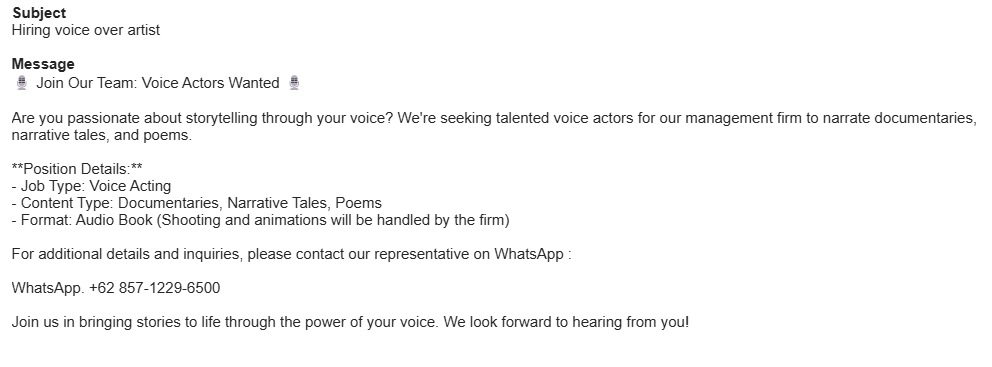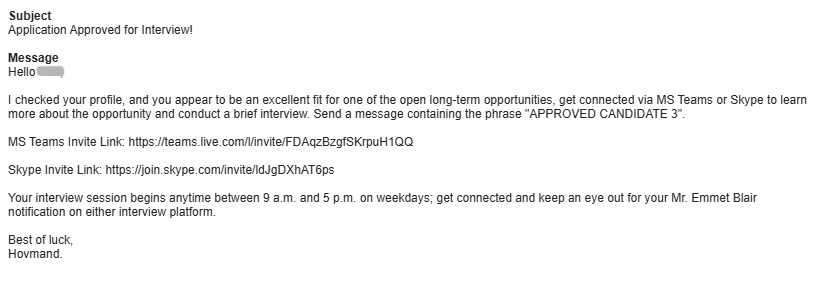
Scams are everywhere, permeating every corner of the job market and spanning across different industries. Whether you're browsing listings for voice acting jobs, graphic design projects, or software development roles, the risk of encountering shady schemes is ever-present.
Many of the most common scams seen in the voice over industry are adaptations of scams used in other industries. Whether it's fake job postings, phishing emails, identity theft, or payment fraud, scammers rely on familiar tactics to exploit job seekers across different platforms.
Voice over scams often target new, hopeful voice actors, dangling the offer of a paid gig to entice them. Let’s shine a spotlight on the biggest red flags for voice over scams.
The Overpayment Scam Red Flags
An overpayment scam is a scheme where scammers pose as clients offering a job opportunity and send a payment that exceeds the agreed-upon amount. The scammer then requests the recipient to deposit the overpaid amount into their bank account and return the excess funds. However, the initial payment is later revealed to be fraudulent, leaving the victim responsible for any money sent to the scammer.
1. Overpayment For the Voice Over
One of the key red flags in an overpayment scam is when the fake voice buyer sends a check or payment for more than the agreed-upon amount for voice over services. Sometimes they claim the check was a mistake and request you return the “overpayment” via wire transfer or a money order. Sometimes they claim they accidentally sent two checks. A legitimate voice buyer will never ask you to send money back to them.
2. Pay Someone Else or Purchase Equipment
Overpayment scammers will sometimes request you forward the extra money to a third party. They often ask that you use part of the overpaid amount to pay for services such as an engineer, studio rental, or other expenses related to the “project.” Legitimate voice buyers typically handle these costs directly or include them in the initial agreement.
A voice buyer will never send you money to purchase equipment, especially equipment or software that will “monitor your time.” Any request to transfer funds to a third party should raise suspicion.
3. A Cashier's Check or PDF Check
Another red flag is the use of a cashier’s check. While cashier's checks may seem more secure than personal checks, they can be counterfeited or forged and often appear real to a bank teller. The check may clear initially, and it can take weeks for the bank to discover the check is fraudulent. Cashier’s checks are not a common method of payment for voice overs.
A newer version of this scam involves a PDF check. A PDF check is a digital version of a paper check. Although sometimes used in legitimate transactions, a PDF check is not a common method of payment for voice overs. Some of these PDF check files may contain a virus. You should not download or click on a PDF check file unless you have scanned the PDF for viruses and fully vetted the client.
4. Focus On the Money
As an overpayment scam progresses, scammers will shift their focus away from discussing the details of the voice over project and become solely concerned with the money. They may use excuses to divert attention from the original job agreement and try to urgently pressure you into depositing the overpaid funds or sending money back to them. This abrupt change in conversation, from voice over-related matters to urgent requests for financial transactions, should raise immediate suspicion and prompt you to cease communication with the scammer.

The Most Common Voice Over Scams
The Game Show Host Scam
The most common overpayment scam is the Game Show Host scam. It frequently makes the rounds in the voice over industry. In the game show host scam, scammers impersonate game show producers or casting directors, enticing aspiring voice actors with the opportunity to host or participate in a game show. They frequently use the words “game show host” or offer an “assignment for you.”
The Interview Scam
The Interview Scam is another common voice over scam. It starts out by claiming you are an “excellent fit” for an opportunity and requests a brief interview. Sometimes they offer a “voice over job position.” Sometimes the offer is simply for their “esteemed company.”

The scammers will usually ask you to send them a message via various social media such as WhatsApp, Skype, MS Teams, Telegram, Signal or Zoom. Scammers prefer to use communication services where they cannot be easily traced. These are not real jobs and are just a way to engage you and start the overpayment scheme.

Common Terms Used in Voice Over Scams
Many of the most common scams use odd terms that would not be used by someone hiring voice talent. Terms like “generous paid time off” or the “ability to speak clearly” should alert you to a scam. They frequently offer “a flexible vacation schedule” or request that you have “confidence.” You should also be wary of email addresses than contain some form of “HR coordinator” or messages naming you as an “approved candidate.”

Another common introduction to the overpayment scam involves the scammer saying they will send you studio information shortly before the recording. Most non-union voice over work is recorded in home studios. If an on-location job is required, legitimate voice buyers will never wait until the day before the session to send you studio information.
"The job and the recording will be held at a rented studio close to your location, so you don't have to worry about traveling. The name and address of the studio will be forwarded to you before the date of the recording."
New Voice Over Scam
Transfer or Transaction Fee
One of the newest scams making the rounds involves scammers posing as voice buyers who request voice over services and promise payment upon completion. The scammers send out a contract for you to sign, often spoofing a real company. However, after delivering the job, the scammer claims that you need to pay a "banking portal fee” to receive your payment. This is a red flag. Legitimate voice buyers will never ask you to send them money as a condition of receiving payment for your work.

How to Avoid a Voice Over Scam
The bottom line is straightforward: Never, under any circumstances, send money to a voice buyer. Legitimate clients will never require you to pay fees or expenses to receive payment for your voice over services. Protect yourself by verifying the authenticity of clients and avoiding any requests that seem suspicious or unconventional.
You should never send money to anyone ordering voice over work.
It's crucial for voice actors to stay alert and knowledgeable about the prevalence of overpayment scams. By staying educated, exercising caution, and trusting your instincts, you can protect yourself from falling victim to deceptive schemes and continue pursuing your passion for voice acting with confidence and peace of mind.
You may also enjoy: Voice Over Demo Dos and Don'ts
VOPlanet is a global marketplace that connects freelance voice talent with creators, casting directors and other voice buyers. You can post a voice over job for free and get auditions from our professional voice team. Want to join our voice team? Learn more about how to find voice over work.




 VOPlanet Blog
VOPlanet Blog